Masada's legendary siege is missing from the Bible; discover where this pivotal story actually unfolds and why it's absent.
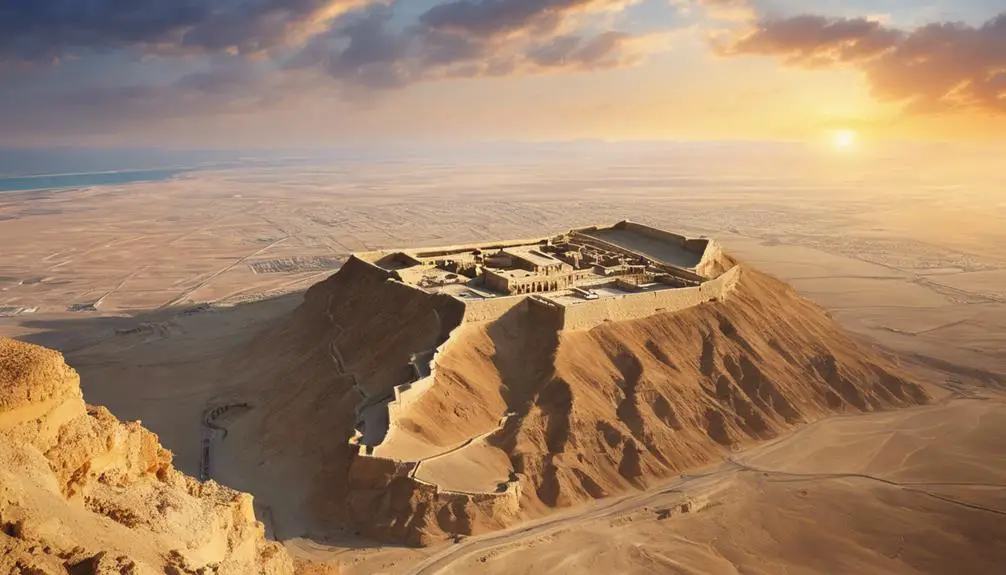
Where Is the Story of Masada in the Bible
If you've been flipping through your Bible looking for the epic siege of Masada, you might want to save your energy. Despite its rich historical significance and dramatic end in 73-74 CE, this fortress's story didn't make the cut into the canonical texts.
Now, you're probably wondering why such a pivotal event in Jewish history is absent from the Bible and where you can actually find accounts of this legendary last stand. As we explore the historical context of Masada, its omission from biblical narratives, and its presence in other historical records and archaeological findings, you'll discover the layers of mystery and reverence surrounding this ancient site.
Key Takeaways
- Masada is not mentioned in the canonical texts of the Bible.
- Its exclusion reflects the complex criteria for scripture inclusion.
- The site's historical and theological relevance may have influenced its absence.
- Masada's story is preserved through Jewish tradition and archaeological evidence, not biblical scripture.
Historical Context of Masada
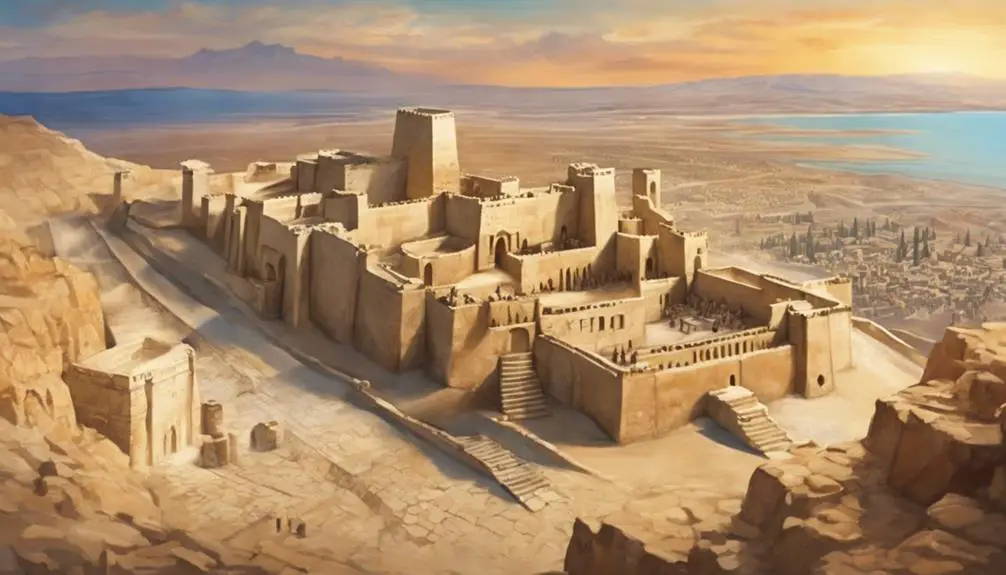
Masada's historical context, a fortress of ancient lore and Jewish defiance, plays a pivotal role in understanding the complex narratives of Jewish resistance against Roman imperialism during the First Jewish-Roman War (66-73 CE). Situated atop an isolated rock plateau in the Judaean Desert, this stronghold became the last bastion for Jewish zealots in their stand against the Roman siege. It's vital to grasp the significance of Masada's strategic location and formidable natural defenses to appreciate the zealots' choice for their last stand. Surrounded by steep cliffs on all sides, Masada was nearly impregnable, symbolizing the indomitable spirit of the Jewish resistance.
The Roman siege of Masada, led by Flavius Silva in 73 CE, epitomizes the lengths to which the Roman Empire would go to assert its dominance. Employing a legion of soldiers and Jewish prisoners of war, the Romans constructed a massive assault ramp, showcasing their engineering prowess and determination to quash any form of rebellion. The siege culminated in a tragic yet heroic end for the Jewish zealots, choosing mass suicide over surrender. This act of defiance has since resonated through history, embodying the themes of freedom and resilience in the face of overwhelming oppression.
Masada's Omission From the Bible
Despite its significant role in Jewish history and the dramatic narrative of resistance against Roman conquest, the story of Masada is conspicuously absent from the canonical texts of the Bible. This omission has puzzled scholars and enthusiasts alike, fueling canonical debates on the criteria for scriptural inclusion. The absence of Masada from biblical texts isn't a mere oversight. Rather, it's indicative of the complex processes that shaped the Bible's composition.
The canonical debates surrounding Masada's omission highlight the nuanced considerations of historical and theological relevance that guided the inclusion of texts. Masada's story, while historically significant, may not have met these stringent criteria. Furthermore, the timing of Masada's siege and fall, around 73-74 CE, suggests it occurred after the primary compilation of many scriptural texts, potentially limiting its scriptural significance.
The exclusion of Masada from the Bible raises questions about the intersection of history, theology, and scriptural canon. It underscores the Bible's role not just as a historical document, but as a theological narrative shaped by specific religious, cultural, and philosophical priorities. This analytical lens might help you understand the complexities behind what stories are told and preserved within sacred texts.
Archaeological Discoveries
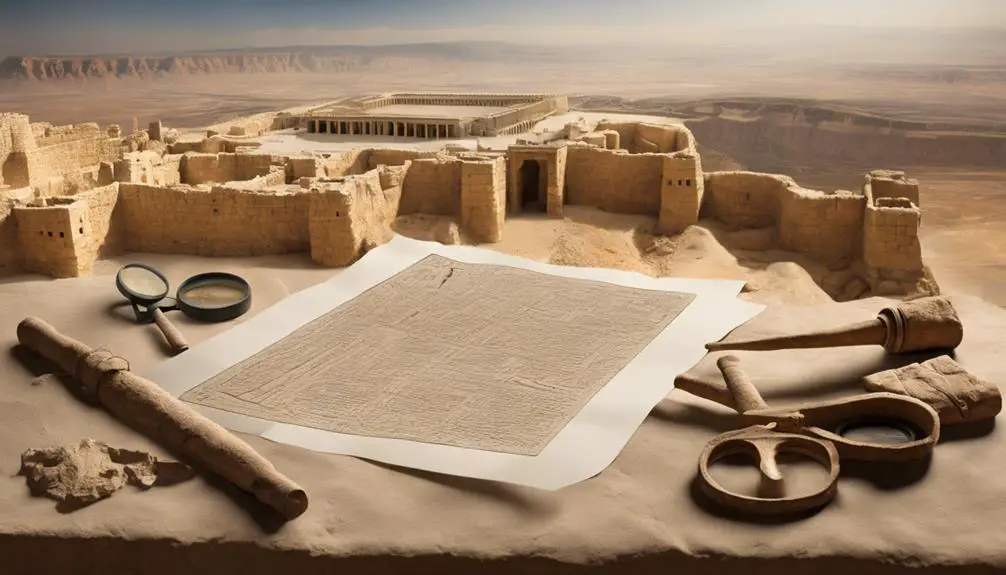
Shifting focus to the tangible remnants of history, archaeological discoveries at Masada have provided invaluable insight into this ancient fortress's last days and the lives of those who made their stand there. Excavation methods have evolved over time, enabling a more nuanced understanding of the site's historical context. By employing advanced techniques and ancient tools, archaeologists have unearthed artifacts that paint a vivid picture of Masada's final hours.
- Advanced Excavation Techniques: Modern archaeological practices, including stratigraphy and radiocarbon dating, have been crucial in dating finds accurately, offering a timeline of events that led to Masada's fall.
- Ancient Tools and Artifacts: The discovery of tools, pottery, and weapons provides evidence of daily life, military preparation, and the siege. These artifacts serve as a direct link to the past, offering a tangible connection to the stories of resilience and tragedy.
- Architectural Insights: The excavation of Masada's complex fortifications and buildings has revealed sophisticated engineering and construction techniques. This knowledge contributes significantly to understanding the strategic importance of Masada and the ingenuity of its inhabitants.
Through meticulous excavation and analysis, archaeologists continue to uncover the layers of history buried within Masada, offering a deeper appreciation for this iconic site.
Masada in Jewish Tradition
Embedded deeply within Jewish tradition, Masada stands as a powerful symbol of defiance and resilience against oppression. Its historical siege narratives not only tell a tale of endurance but also reflect on the complexities of Jewish identity and the struggle for freedom.
Aspect |
Significance |
|---|---|
Masada Symbolism |
Embodies the spirit of resistance, portraying the collective memory of a fight for sovereignty and dignity against overwhelming odds. |
Siege Narratives |
Serve as poignant reminders of the sacrifices made by ancestors, reinforcing values of courage, solidarity, and the pursuit of justice. |
Analyzing the role of Masada in Jewish tradition reveals layers of meaning beyond the historical account. It's not merely a site of ancient conflict; it represents an enduring narrative of survival against destruction. This symbolism has been woven into the cultural and religious fabric, highlighting the importance of memory and resilience in the face of adversity.
Masada's story, while not detailed in biblical texts, is integral to understanding the collective Jewish experience. It stands as a testament to the unyielding human spirit, inspiring future generations to remember and to learn from the past. Through the lens of Masada, you grasp not only the gravity of historical events but also the unbreakable will of a people determined to maintain their identity and values.
Preserving Masada's Legacy
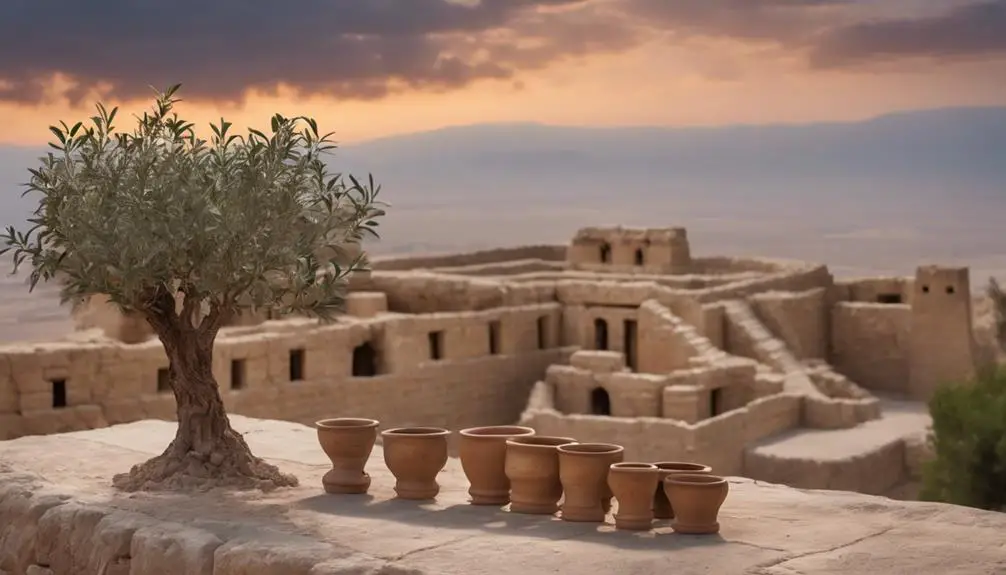
As efforts to preserve Masada's legacy intensify, they reveal the site's profound importance in contemporary cultural and historical discourse. The challenge lies not only in maintaining the physical structure but also in managing the delicate balance between cultural tourism and the environmental impact it brings. You're witnessing a pivotal moment where history, preservation, and sustainability intersect, demanding innovative approaches and solutions.
- Sustainable Tourism Practices: Emphasizing the need for strategies that minimize visitor impact while maximizing educational and cultural exchange. This includes controlled access, guided tours that educate on preservation, and infrastructure that supports environmental conservation.
- Advanced Preservation Techniques: Utilizing cutting-edge technology to monitor and protect the integrity of Masada's structures against natural and human-made threats. Techniques such as digital mapping and non-invasive archaeology play pivotal roles in understanding and preserving the site without further damaging it.
- Community and Global Engagement: Encouraging a global dialogue on the significance of Masada, fostering a sense of shared responsibility towards its preservation. This involves collaborative efforts between governments, NGOs, and international bodies to fund and support preservation initiatives.
Through these efforts, you're invited to partake in a journey that not only honors Masada's past but ensures its legacy endures for future generations.
Frequently Asked Questions
How Does the Story of Masada Inspire Modern Leadership and Decision-Making in Contemporary Contexts?
The story of Masada isn't in the Bible, but it's a powerful narrative that inspires leadership resilience and decision-making ethics in modern contexts.
You can learn the importance of steadfastness and moral clarity when faced with challenging circumstances.
It teaches you that in leadership, sometimes tough decisions must be made, but they should always be grounded in ethical considerations and a commitment to the welfare of those you lead.
Are There Any Artistic or Literary Works Directly Influenced by the Masada Narrative That Are Not Related to Historical or Religious Texts?
Yes, the Masada narrative has significantly influenced artistic and literary works beyond historical or religious texts. Specifically, the Masada opera and various poetry interpretations offer rich, creative explorations of the story.
These works delve into themes of freedom, sacrifice, and resilience, providing nuanced, emotional perspectives on the Masada story. They serve as a testament to the narrative's enduring impact on cultural expressions, inviting audiences to engage with its legacy in innovative ways.
Has the Tale of Masada Been Featured or Referenced in Popular Media, Such as Movies, TV Shows, or Video Games, and How Accurately Do These Portrayals Reflect the Actual Events?
You might've noticed Masada's tale popping up in various forms of popular media, including movies, TV shows, and video games. These portrayals often highlight Masada symbolism and siege strategies, giving a nod to the event's historical significance.
However, they sometimes play fast and loose with accuracy, prioritizing drama over factual representation. By analyzing these depictions, you can see how Masada's story is adapted and symbolized, albeit with varying levels of historical fidelity.
What Are the Ecological Impacts of Tourism at the Masada Site, and What Measures Are Being Taken to Ensure the Sustainability of the Area for Future Generations?
The ecological impacts of tourism at Masada include erosion and habitat disruption. To preserve the area for future generations, measures like ecological restoration and strict visitor management are being implemented.
You're seeing efforts to rehabilitate native vegetation and control the flow of tourists to reduce wear on the site. These steps are crucial in ensuring Masada remains a testament to history while safeguarding its surrounding environment.
How Do Different Religious Communities Outside of Judaism Interpret or Give Significance to the Story of Masada, if at All?
You're exploring how various religious groups beyond Judaism perceive Masada, delving into whether it holds any significance for them. This quest often intersects with cultural appropriation concerns and interfaith dialogues.
While some communities might find universal themes of resilience and freedom in Masada's story, others may critique or reinterpret its narrative within their theological frameworks. Analyzing these perspectives reveals a complex tapestry of how sacred histories are woven into the fabric of diverse religious identities.
Conclusion
In conclusion, while Masada's story isn't found in the Bible, its significance in Jewish tradition is undeniable. Archaeology has brought its silent stones to voice, revealing a site of defiance and tragedy.
Interestingly, Masada attracts over 800,000 visitors annually, a testament to its enduring allure. This statistic not only highlights its historical importance but also reflects its role in contemporary cultural identity.
Preserving Masada's legacy is crucial for understanding past resistances and inspiring future generations.

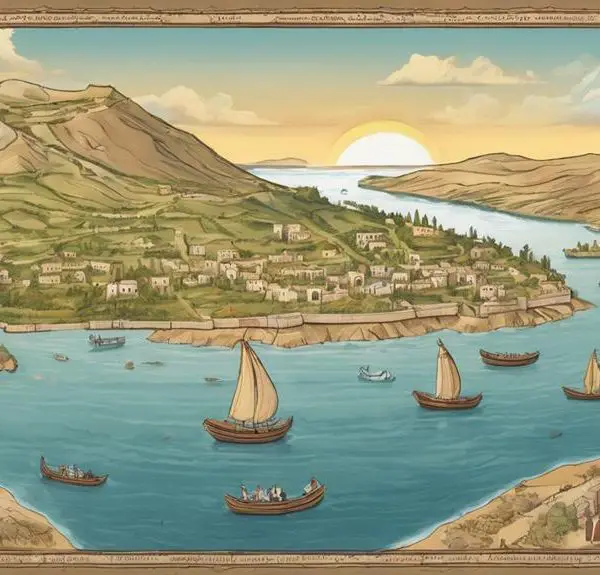
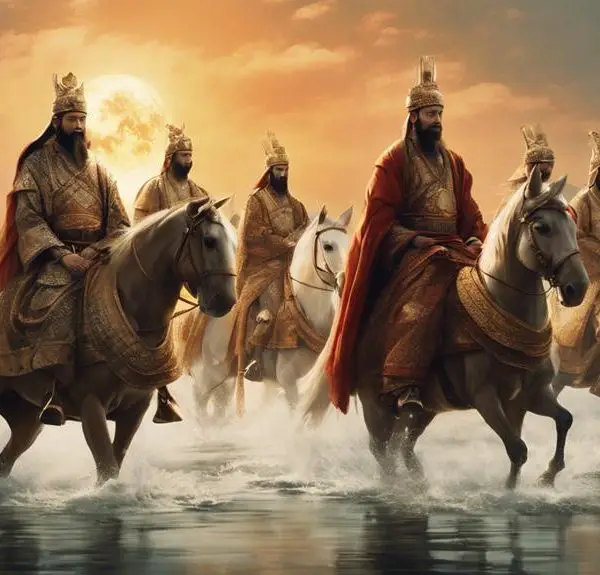
Sign up